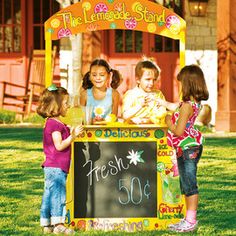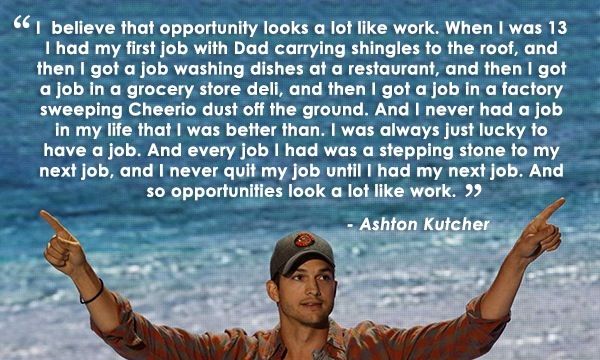Lesson 1: Don’t Take Short-cuts- Quality Matters
Age: 4
Product/Platform- Hot Chocolate Stand
When I was four years old, my parents helped me set up a hot chocolate stand in our front yard. It was late fall in Lynchberg, Virginia, so I was bundled up in layers and scarves but all the wool and cotton in the world could not contain my excitement every time a car would drive up, read the sign that said “$.25 for a cup of hot chocolate” and ask for one. My mom was very innovative and had made hot chocolate in our coffee machine and then attached about 7 different extension cords together so it reached all the way outside, so all I had to do was press a button and the hot chocolate would pour into the Styrofoam cup and then my mom would screw on the lid and I would walk it over to our customer’s car door and thank them for being a customer. Eventually, supplies at the stand started to run low and my mom was forced to go back inside and make a second batch of hot chocolate so I could collect my quarters. During this time, I was left alone at the hot chocolate stand to fend for myself, so when a customer pulled up and asked for a hot chocolate and I knew that we didn’t have any, I didn’t want to seem like a fraud, so I sneakily walked behind the stand, found a semi-deep puddle of liquidy-mud (it has just stormed), filled the cup up to the top, and marched it over to the customer with a proud smile on my face that I was able to figure out a solution all on my own. The man handed me his quarter and without hesitation took a relatively large drink from the cup and then proceed to spit it all over his car. I have never seen a man look at a four-year-old girl with so much contempt before he threw the cup onto the street and sped off. I learned then that if my sign says I’m giving someone hot chocolate, I better make sure that’s what they get because absolutely no one likes being scammed- even if it’s be an adorable four-year-old who thought she was being helpful.
Lesson 2: Smiling and Having a Positive Energy Can Go a Long Way
Age- 6
Product/Platform- rollie pollies/D2D
Shortly following the hot chocolate fiasco, my parents relocated my sister and I to the state of endless cornfields, sunflowers taller than my parents, and nice people who talked slow and treated everyone like their grandchild. Kansas. We moved into a much nicer neighborhood, with people who were always out in the lawn or at the park and everyone waved when you passed them. I knew my opportunities here were limitless. However, I was interested in trying out a different sales method entirely and, correspondingly, I figured out that a new product would be best as well. At first I considered my coin collection but my dad told me no. Then I was going to sell my sisters toys, but she noticed they were missing and I got grounded for a week which gave me the time I needed to come up with the product I was searching for- something that wouldn’t require me to give up anything, was already available in bulk, and would be easy to transport (I had decided that going door to door selling would be my new approach). It was then, during my week of grounding, when I was out sitting in the lawn that I noticed these tiny little adorable creatures that consumed our sidewalk. Rollie Pollies. I studied them and decided that they’d make an excellent product. I already had a ton of them and they were, in my eyes, very cute. I figured my neighbors could maybe treat them like mini pets or would just be impulsive enough to buy them based solely on how cute they were. So I collected two jars, filled the bottom with grass, and one by one place each rollie pollie inside so that I could go out and find them a new home. It never crossed my mind that every other yard in the neighborhood may already have rollie pollies too. Despite this, when I’d knock on the doors and greet my neighbors with a giant smile on my face and then launch into my pitch with all the excitement and enthusiasm in the world telling them about how great these rollie pollies were, I very rarely got turned down. Maybe it was because people don’t like saying no to a six year olds face. Maybe it was because they were only $.10 (Although I got a surprising amount of tips), but this venture was successful despite all the odds, data, and common sense against it. I learned that smiling a lot and being excited about my product can take me a very, very long way.
Lesson 3: Location Matters
Age: 10
Product/Platform- Neighborhood Snow Cone Stand
When I was ten, my family up and moved to Missouri in the middle of the summer and I decided to give entrepreneurship another shot. I didn’t know anyone in Missouri, so when I saw a lot of the local kids setting up lemonade stands in their front yards, I immediately started evaluating them as my competition. I saw that some kids had started adding a twist with pink lemonade or offering koolaid instead. Some kids had fancy stands their parents probably spent a good amount of money on. I had a 4/4 table, a cooler, and a safe. Initially, I thought I’d set myself apart by selling snowcones instead of lemonade. I thought this was an absolute stroke of genius. I had an excellent snowcone machine- it was fast, I could load the ice in myself, and I could offer my customers up to five different flavors. I thought for sure that I was about to monopolize the entire neighborhood. That’s not what happened. Instead, I received the same amount of traffic because there’s only a certain amount of people that drive past my front yard everyday, but I was able to make more money because people were willing to pay more for my product since it was significantly better than the competitions. Two of the neighborhood rivals, an eight year old boy and an twelve year old girl, eventually left their own stands and asked if they could work at mine with me. I didn’t like the idea of profit-sharing and they could sense my hesitation, and it was then that Cheryl Sommers, the eight year old, offered me something that I had never even considered before. A prime spot at the gazebo of her neighborhood which, although it was only two streets over, had houses valued at twice the amount of mine and a corresponding amount of stay at home moms and nannies- every single one who would know actually have to drive past our stand and say yes or no to us if they wanted to enter their own neighborhood. Business SKYROCKETED. Once the car lines started backing up, people began parking their cars and coming up to the gazebo to wait in line. My mom brought a boom box (yes, that was relevant then) and would chit chat with our new neighbors as I hustled around, barking out orders for more ice and new cups and for Evan (my new boy business partner) to stop eating all of the snow cone syrup. We put every lemonade stand on that street out of business- mostly because they decided that they’d rather walk over to our nice shaded gazebo and get a snow cone for themselves as well. Cheryl and that Gazebo taught me the incredible importanance of location when selling- and it’s a lesson that I still utilize on a weekly basis.
Lesson 4: People Like To Buy Things That Make Them Feel Good About Themselves
Age- 10
Product/Placement- Neighboor Bake Sale in the Gazebo (for Charity)
When fall approached, the demand for snow cones went down but there was no way I was giving up my prime Gazebo location, so one day we went to Cheryl’s to brainstorm how we could combat the lurking cooler weather. Cheryl’s mother, the elementary school librarian, overheard our conversation and asked her what we were doing with the money we were raising. I told her I had just bought the Sims game but other than that, the money stayed in my safe because I didn’t really know what to do with it- I just liked the challenge of getting it. Cheryl’s mom’s eyes lit up when she heard this (her own daughter hid all of her money and secretly spent it on trips to Walmart and the mall with her dad), and then she casually asked if I wanted to taste the brownies she was making. I was ten so of course I agreed, and they tasted like heaven. I remember saying “Mrs.Sommers, you have to let me sell these! They’ll make us millionaires and you can have every book in the library!” and she smiled and presented my very first negotiation- she would provide a plethora of bake sale items every Friday, Saturday, and Sunday. Brownies, Cake, every cookie imaginable- she could bake it all- and then, the real curveball, she’d give them to us for FREE to sell! The only catch was the we had to donate half of the proceeds towards getting back the school districts fourth grade camp that they had recently eliminated due to budget cuts. I didn’t care at all about the money, I was excited to sell such an awesome product, so I excitedly agreed and we set up shop two days later. Mrs. Sommers went above and beyond. She posted flyers about our bake sale and the cause behind it. She upgraded me to a six foot table and decorated it with delicacies and pamphlets about the camp behind our “fundraiser”, as she was now insisting on calling it. If I thought business was busy before, this was busy on steroids. Apparently, when it comes to baked goods, there’s a good amount of people who like to buy in bulk. There’s also a lot of parents who had kids who wanted the camp back. And then Mrs. Sommers made her final play- she called the local new station and let them know that a seven and an eight year old were dedicating every second of their weekends to raise money so they can go to a camp one day that every child would have gotten to go to for free a year beforehand. An entire news team showed up at our Gazebo. They didn’t ask any questions about our brownies, but they asked a lot of questions about why I wanted to go to camp (I had literally never thought about it until the microphone was in front of my face) and how much of an inspiration we were. We made the front-page news. A month later, the school districts reinstated that all four graders get to go to camp. We became neighborhood heroes. I have no idea how much we donated- it wasn’t nearly enough to have a financial impact- but people were far more influenced by the heart and the passion they saw behind those two young girls in the Gazebo who they assumed just really wanted to go to camp, but really we just liked selling stuff.



